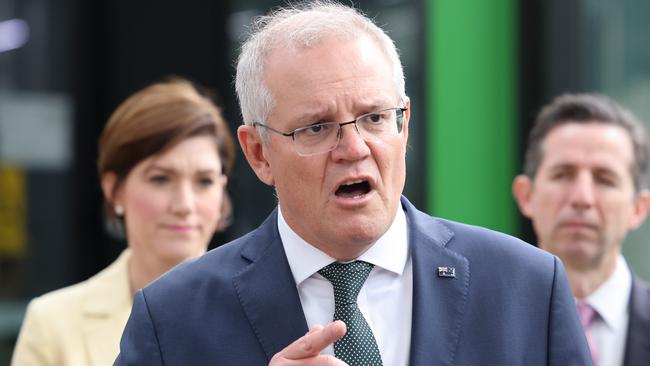Jenkins Inquiry: One in three parliamentary staffers sexually harassed
A landmark review found more than 50pc of staff experienced bullying, sexual harassment or actual or attempted sexual assault.

A landmark 456-page report lifting the lid on parliamentary culture has recommended a restriction of alcohol, gender equality targets, new codes of conduct for MPs and their staff as well as specific actions to achieve a greater gender balance in parliament.
The report led by Sex Discrimination Commissioner Kate Jenkins found that more than 50 per cent of staff at Parliament House had experienced bullying, sexual harassment or actual or attempted sexual assault.
It found that one in three people (33 per cent) who were currently working in Parliament House and had responded to the survey had experienced some form of sexual harassment while working there, with one per cent having experienced some form of actual or attempted sexual assault.
Commissioned after the alleged sexual assault of former Liberal staffer Brittany Higgins, the report revealed serious and systematic cultural issues that plagued Parliament House, stemming from a “leadership deficit”, power imbalances and a lack of diversity.
Of the 1723 people who took part in the review, more than one in two employees had “experienced bullying, sexual harassment or actual or attempted sexual assault”, while 77 per cent had experienced, witnessed or heard about instances of bullying, sexual harassment and/or sexual assault.
One of the participants in the report relayed how an MP had “grabbed me and stuck his tongue down my throat. The others all laughed. It was revolting and humiliating.”
A common theme related by staff in commonwealth parliamentary workplaces was a “leadership deficit” in which “leaders themselves were responsible for bullying, sexual harassment and sexual assault.”

The report also noted their “inadequate responses to the misconduct of others.”
Of the 28 recommendations, the Independent Review into Commonwealth Parliamentary Workplaces called for the establishment of two new bodies to police the culture in the nation’s most powerful building and an overhaul of how staffers are terminated.
The two new bodies which are proposed include a new “Office of Parliamentarian Staffing and Culture” to provide centralised human resources support to staff. This would provide greater HR support, oversee the operation of the MOP(S) Act and take over functions currently performed by the Department of Finance.
‘Standards Commission’ proposal
Separately, the report proposed the establishment within 12 months of an “Independent Parliamentary Standards Commission” with the power to handle formal misconduct complaints and make findings about misconduct.
Other key recommendations included the formation of a new Joint Standing Committee on Parliamentary Standards within six months. This would develop a new draft code of conduct for parliamentarians (to be adopted within 12 months) and a draft code for parliamentarians’ staff. In addition, a draft standards of conduct for the parliamentary precincts would also be implemented.
The report proposed that a “Statement of Acknowledgment” in which party leaders and the heads of the parliamentary departments would come together and agree on a statement to “acknowledge the harm, caused by bullying, sexual harassment and sexual assault in Commonwealth parliamentary workplaces.”

Scott Morrison condemned sexual assault and gender inequality in Parliament House, and committed to a process of cross-party consultation before releasing a final response to the report. The Prime Minister said he would respond in “good faith” to the 28 recommendations.
“We all share in an ownership of the problems set out in this report, but we all share in implementing the solutions,” he said.
He warned the findings were “appalling and disturbing.”
“Like anyone who works in this building, I find the statistics that are presented here, of course appalling and disturbing,” he said. “I wish I found them more surprising. But I find them just as appalling.”
“And that’s why the actions I think that are recommended do cover all the territory that they’ve been able to take us forward. And what I’ve seen has only reinforced my view about the actions that we’ve already taken.”
‘Power imbalance’
Ms Jenkins said her report revealed that power imbalances and lack of accountability were key drivers of the widespread sexual harassment experienced by political staffers.
Speaking in Sydney, Ms Jenkins said the recommendations made in the report were “simple solutions to a complex problem.”
“We heard that power imbalances and the misuse of power was one of the primary drivers of bullying, sexual harassment and sexual assault,” she said.
“Gender inequality and wider lack of diversity, particularly evident in the low representation of women in leadership roles, means women are more likely to experience misconduct.”
Ms Jenkins said many people who reported misconduct faced retribution while others who engaged in misconduct were protected, rewarded and promoted.
She said the report would help bring Parliament House in line with workplaces around the nation.
“The recommendations in this report are designed to bring parliamentary workplaces into line with the standards expected of all modern Australian workplaces and support all parts of the parliament to perform at their best,” she said.
Ms Jenkins said the report asked the nation’s parliament to do “no more than it expects from all Australian workplaces.”
She said Australia’s parliament had the chance to become a global leader in setting a parliamentary workplace standard.
Chance to ‘transform’ parliamentary culture
In the forward to her report, Ms Jenkins said it provided an opportunity to “transform” Commonwealth parliamentary workplaces, where expected standards of behaviour could be “modelled, championed and enforced”.
“Too often, we heard that these workplaces are not safe environments for many people within them, largely driven by power imbalances, gender inequality and exclusion and a lack of accountability. Such experiences leave a trail of devastation for individuals and their teams and undermine the performance of our parliament to the nation’s detriment,” she said.
“We concluded that while Commonwealth parliamentary workplaces are unique, they are not exceptional. It is time for our best workplace practices to live in these workplaces.”
“Power and influence run in many directions in these workplaces, so we have proposed five shifts designed to ensure that power and influence always lean towards safety and respect, enabling high performance.”
Ten-year strategy to achieve gender balance, diversity
The review also proposed to overhaul the process for terminating staff under the MOP(S) Act. These proposed changes would include the issuing of new guidance materials on the termination of employees for parliamentarians and amendments to the MOP(S) Act ensuring that a notice of termination must list the reason for the termination decision.
A parliamentarian would also be required to inform the Office of Parliamentarian Staffing and Culture promptly, in writing or orally, of any proposed dismissal ahead of time. The Office of Parliamentarian Staffing and Culture would then advise the parliamentarian whether the proposed dismissal satisfied legal requirements under the Fair Work Act.
A ten-year strategy aimed at advancing gender equality, diversity and inclusion is proposed with the review recommending targets to achieve a better gender balance among MPs. The targets would be accompanied by an annual public report outlining the diversity of MPs by party.
The report elevated power imbalances and misuse of power as one of the “primary drivers of misconduct” in parliament, with participants arguing that it was the fear of those in positions of power and a sense of entitlement that were particularly problematic.
“It is a man’s world and you are reminded of it every day thanks to the looks up and down you get, to the representation in the parliamentary chambers, to the preferential treatment politicians give senior male journalists,” one participant said.
The report found that women experienced sexual harassment at a higher rate (40 per cent) compared with men (26 per cent). More female parliamentarians (63 per cent) have experienced sexual harassment when compared with male MPs (24 per cent).
Ms Jenkins argued that the key problems driving the negative culture in parliament stemmed from power imbalances, gender inequality, a lack of accountability and a lack of diversity.
Time to change parliament forever: Gillard
Former prime minister Julia Gillard said Ms Jenkins’ report showed “it’s time to change our federal parliament forever”.
“We need a code of conduct and an effective way of receiving and acting on complaints. The Jenkins review gives us this,” she said.
Ms Gillard –- who leads the Global Institute for Women’ Leadership – urged all political parties to urgently commit to implementing the necessary bold reform.
Ms Higgins – a visiting fellow at the institute – said she hoped Ms Jenkins’ report “inspired immediate action.”
“I want to thank the many brave people who shared their stories which contributed to this review. I hope all sides of politics not only commit to but implement these recommendations in full,” she said.


